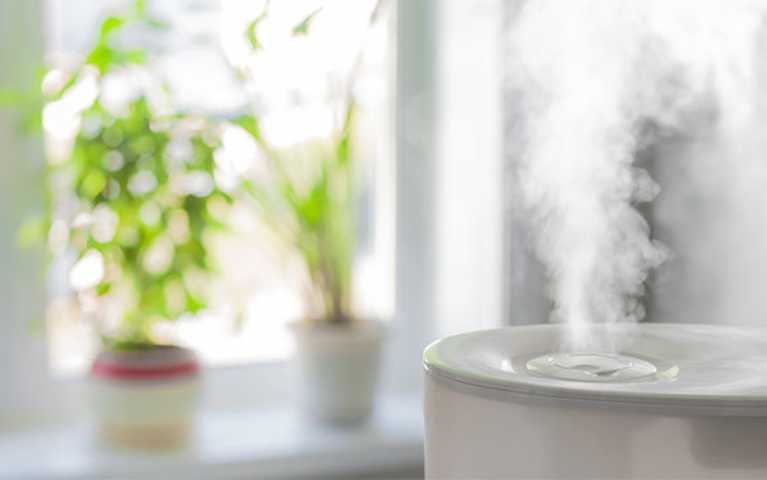Ultra-low humidity can cause dryness that makes sleep tough. On the flip slide, too much humidity can lead to allergen growth, more congestion, or worse. A study in Indoor Air, the international Journal of Indoor Environment and Health, found that improving indoor air quality, which includes appropriate humidity levels, leads to better quality sleep.
Humidity recommendations vary widely; most are between 30% and 60%, with 30–45% as ideal. But the ideal humidity level varies and is individual. “Humidity ideally should be about 30%,” says Dr. Murray Grossan, author of The Whole Body Approach to Allergy and Sinus Health. “If the humidity in your home is above 50%, it may cause mold and fungus growth, which can aggravate allergies, which can also impact sleep.” During allergy season, humidity below 50% is recommended to reduce risk of allergen growth (dust mites, bacteria, etc.).
“In your respiratory system you have microscopic hairs called cilia. These require moisture in order to beat and move pollens, dust, bacteria, etc. out of the nose and chest. In excessive dryness, the cilia can't do their job. Bacteria remain in place and multiply.” So, a starting rule of thumb would be to adjust your humidity to 30-45%; see how it feels and adjust accordingly.
Here are a few signs it may be time to adjust the humidity in your home:
-
Mold in a closet, which indicates a damp environment
-
Bathroom towels that never dry, which indicate air already full of moisture
-
A dry throat and cracked lips after sleep, which indicate a potentially dry sleep environment
-
Persistent bloody noses, which could also indicate a too-dry sleep environment
Dry Air, Colds and Congestion During Your Sleep
In dry climates, sinus membranes dry out, which irritates them. When they get irritated, they produce that stuffy feeling. You might find it hard to breathe. Overly dry air can also irritate your nasal passages, so they crack, which means viruses inhaled have easier access to your body. Add this to the fact that cold viruses live longer in dry air, as the Mayo Clinic notes, and you can begin to see how ultra-low humidity not only impacts your sleep but can impact your overall health. Dry air can cause nosebleeds for the same reason.
“Most important part of nose breathing is the nitric oxide,” says Dr. Martha Cortes, a dentist in New York City. “When nitric oxide is released, it dilates the back of the nose, dilates our airway and dilates our lungs. The nose is the most important thing to humidify. We were not meant to be inside dry apartments and dry houses.”
Dry air impacts your skin as well, and if you are prone to eczema or have other allergies, low humidity levels might exacerbate that. In dry air conditions that occur in homes with radiator heating, most experts recommend having a humidifier in the bedroom and cleaning it daily to reduce allergen growth. A low-tech way to add humidity to a dry home is to turn on the shower or to leave a pot or bowl of water in the bedroom, where it will evaporate. Such methods aren't always practical if you have children or pets, but they do work, according to Mother Nature Network.
A home that operates on central or forced hot air has more options. Usually, the humidity can be controlled from the furnace or boiler. There are also whole-home humidifiers or bypass humidifiers, as opposed to a small, one-room humidifying gadget.
Cortes recommends going the low-tech route: put a tiny bit of Vaseline or oxygenated olive oil in your nose (or your kid's nose).
“When I check into a hotel and it is dry, I immediately fill the bathtub and also hang wet towels to moisten the air in the bedroom,” he says, before giving his last tip for those who need to create a healthier sleep environment. “For most people, an inexpensive vaporizer may be needed.”
In the end, Grossan says, common sense and paying attention to your sleep environment will help.
Like diet and exercise, quality sleep is essential for optimal wellbeing and performance. Because everyone's sleep needs are different, Sleep Number® smart beds sense your movements and automatically adjust firmness, comfort and support to keep you both sleeping comfortably. Find your Sleep Number® setting for your best possible night's sleep, and if you own a Sleep Number® bed, log in to your Sleep Number® Rewards account to see your exclusive offers, refer friends and more.
